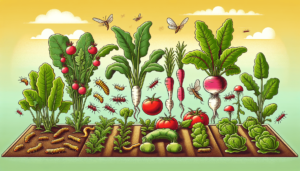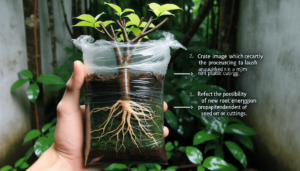We’ve all seen the harmful effects of conventional pesticides on the environment, but did you know there is a safer alternative? Organic pesticides, derived from natural sources, offer a multitude of benefits for both the environment and our health. Not only do they effectively control pests, but they also minimize the risk of contamination in our food and water sources. This article will explore the numerous advantages of using organic pesticides and how they can contribute to a healthier, more sustainable future.
Reduced Environmental Impact
Protection of beneficial insects and wildlife
Using organic pesticides is beneficial for the environment as it helps protect beneficial insects and wildlife. Unlike conventional pesticides, organic pesticides are made from natural ingredients, such as plant oils and extracts, which are less harmful to non-target species. This means essential pollinators like bees and butterflies are not harmed during pest control activities. By preserving the populations of beneficial insects, organic pesticides contribute to the overall balance of ecosystems.
Prevention of water contamination
Conventional pesticides have the potential to contaminate water sources through runoff, which can have severe environmental consequences. However, organic pesticides are designed to break down more quickly and have less persistence in the environment. This reduces the risk of water contamination, safeguarding water quality for humans and aquatic organisms. We can help protect our water resources by choosing organic pesticides and ensuring their long-term sustainability.
Preservation of soil health
Using organic pesticides helps maintain soil health by avoiding the harmful effects of conventional pesticide use. Organic pesticides are derived from natural sources and do not contain synthetic chemicals that can degrade soil quality. By preventing the depletion of beneficial soil microorganisms and preserving nutrient cycles, organic pesticides promote a healthy and fertile soil ecosystem. This, in turn, leads to better crop yields and long-term sustainability of agricultural practices.
Healthier Food
No harmful pesticide residues
One significant advantage of organic pesticides is that they leave little to no harmful pesticide residues on our food. Unlike conventional pesticides, organic pesticides decompose more rapidly, reducing the likelihood of chemical residues on produce. This is especially important for consumers who prefer to limit their exposure to synthetic chemicals and want to enjoy fresher, safer, and healthier food options.
Higher nutrient content
Research shows that organic farming methods, including organic pesticides, can result in higher nutrient content in crops. Organic crops have higher nutrients such as vitamins, minerals, and antioxidants. This is believed to be due to the healthier soil conditions and the natural nutrient cycling that organic farming practices promote. By choosing organic pesticides, we can contribute to producing food that is safer and more nutritious for our overall well-being.
Safe for Humans
Reduced risk of pesticide exposure
Using organic pesticides significantly reduces the risk of pesticide exposure to humans. Conventional pesticide residues can lead to health issues when consumed or when farmworkers contact them during application. Organic pesticides, on the other hand, are made from naturally occurring ingredients and have been shown to have lower toxicities. By utilizing organic pesticides, we can protect ourselves and those working in agriculture from unnecessary exposure to harmful chemicals.
Less harmful effects on human health
Organic pesticides are designed to be less harmful to human health than synthetic ones. They undergo rigorous testing to ensure they meet human consumption safety standards. By using organic pesticides, we can minimize the potential risks of pesticide use, such as respiratory problems, skin irritation, and long-term health effects. This approach is essential for vulnerable populations, such as children, pregnant women, and individuals with compromised immune systems.
Targeted Pest Control
Selective targeting of pests
Organic pesticides offer targeted pest control, allowing farmers to focus on specific pests while minimizing the impact on beneficial organisms. Unlike conventional broad-spectrum pesticides, organic alternatives are often designed only to affect certain pests, leaving other non-target species unharmed. By targeting pests selectively, organic pesticides help maintain a balance in the ecosystem and reduce the need for blanket pesticide applications that can disrupt natural biological processes.
Preservation of non-target species
Using organic pesticides ensures the preservation of non-target species, which play vital roles in maintaining biodiversity. Conventional pesticides can harm many organisms, including beneficial insects, birds, and mammals. Organic pesticides, on the other hand, are less harmful to these non-target species, allowing them to carry out their essential ecological functions. By preserving non-target species, we contribute to ecosystems’ overall health and resilience.
Improved Ecosystem Balance
Promotion of natural predator-prey relationships
Organic pesticides promote natural predator-prey relationships, which are vital for ecosystem balance. By selectively targeting pests, organic pesticides allow populations of beneficial predators to thrive, as they have a ready food source. This helps control pest populations naturally and reduces the reliance on chemical interventions. By encouraging natural predator-prey relationships, organic pesticides contribute to ecosystems’ overall stability and health.
Maintenance of biodiversity
Biodiversity is essential for ecosystem sustainability, and organic pesticides play a significant role in its preservation. By reducing synthetic chemicals that can harm biodiversity, organic pesticides help maintain diverse species, from insects to birds and mammals. This is crucial for ensuring the long-term resilience of ecosystems and adapting to changing environmental conditions. By supporting organic pesticides, we contribute to maintaining biodiversity and preserving balanced and thriving ecosystems.
Lower Resistance Development
Reduced risk of pesticide resistance
Using organic pesticides can help reduce the risk of developing pesticide resistance in target pests. Conventional pesticides, when used extensively, can lead to the emergence of resistant pest populations, making pest control more challenging over time. Organic pesticides, on the other hand, often utilize multiple modes of action and rotate different products, preventing pests from developing resistance. By adopting organic pest control strategies, we can maintain the long-term effectiveness of pest management and avoid the need for more drastic measures in the future.
Long-term effectiveness in pest control
Organic pesticides offer long-term effectiveness in pest control by employing integrated pest management (IPM) approaches. IPM combines tactics, such as biological controls, cultural practices, and targeted pesticide applications, to manage pests effectively. When utilized as part of an IPM program, organic pesticides contribute to sustainable and ongoing pest control solutions. Farmers can achieve pest control goals without relying solely on synthetic chemicals and reduce the negative impacts on the environment and human health.
Sustainable Farming Practices
Conservation of natural resources
Organic pesticides support sustainable farming practices by promoting the conservation of natural resources. These pesticides are often derived from renewable plant materials, and synthetic chemicals from non-renewable sources should be avoided. By reducing the reliance on non-renewable resources, organic pesticides contribute to the overall sustainability of agricultural systems. They enable us to preserve resources for future generations while maintaining productive and resilient farming practices.
Support for sustainable agriculture
Using organic pesticides aligns with the principles and objectives of sustainable agriculture. Sustainable agriculture aims to maintain the productivity of land while minimizing environmental impacts. Organic pesticides help achieve these goals by nature as they are designed to have minimal adverse effects on ecosystems, soil health, and water quality. By supporting the use of organic pesticides, we actively contribute to advancing sustainable agriculture, leading to a more sustainable and secure food system.
Protection of Human Rights
Safer working conditions for farmworkers
The use of organic pesticides can contribute to safer working conditions for farmworkers. Conventional pesticides often require stringent protective gear and precautions during application to minimize exposure risks. Organic pesticides, being less toxic, reduce the need for extensive protective measures, making the work environment safer for agricultural laborers. Using organic pesticides, we prioritize the well-being and safety of the people involved in food production and contribute to a more equitable and just agrarian industry.
Less exploitation of labor in pesticide production
The production of conventional pesticides, often synthetic chemicals, can negatively impact labor rights and worker health. Many workers involved in pesticide production are subject to hazardous working conditions and exposure to toxic substances. By opting for organic pesticides, which rely on natural ingredients, we help reduce the exploitation of labor associated with conventional pesticide production. This supports fair and sustainable practices across the entire pesticide supply chain.
Community and Consumer Support
Increased demand for organic produce
The choice to use organic pesticides goes hand in hand with increased consumer demand for organic produce. As more individuals become aware of the benefits of organic farming and the use of organic pesticides, the demand for organic products continues to rise. This consumer support helps promote sustainable agricultural practices, encourages more farmers to adopt organic methods, and supports the growth of the organic industry. By favoring organic produce, we support local farmers, strengthen local economies, and contribute to overall community well-being.
Positive impact on local economies
The use of organic pesticides and the corresponding demand for organic produce positively impact local economies. Organic farming practices often require more labor-intensive methods, creating additional job opportunities in agricultural communities. Increased demand for organic produce stimulates economic growth, leading to the revitalization of rural areas and the development of sustainable local food systems. By supporting organic farming and pesticide use, we contribute to the prosperity of regional economies and the resilience of rural communities.
Long-term Cost Savings
Decreased need for repeated applications
Using organic pesticides can lead to long-term cost savings for farmers. Unlike conventional pesticides, which may require repeated applications due to resistance development or rapid degradation, organic pesticides often provide effective control with fewer applications. This reduces the overall cost of pest management, including both the pesticides’ cost and the labor required for application. By minimizing the need for excessive pesticide use, farmers can allocate their resources more efficiently and improve their economic viability in the long run.
Reduced healthcare costs
By choosing organic pesticides and supporting organic farming practices, we can contribute to reduced healthcare costs. Conventional pesticides have been linked to various health issues, including respiratory problems, neurological disorders, and certain cancers. We can prevent or mitigate these health risks by minimizing exposure to synthetic chemicals through organic pesticide use and reducing healthcare expenses. This has positive implications for individuals and society as a whole, leading to improved public health outcomes and cost savings in healthcare systems.
In conclusion, using organic pesticides offers many benefits for our society and environment. From protecting beneficial insects and wildlife to promoting healthier food options, organic pesticides contribute to a safer and more sustainable agricultural system. They prioritize human health and well-being, preserve ecosystem balance, and support the development of long-term pest management strategies. Furthermore, organic pesticides align with sustainable farming practices, protect human rights, and positively impact local communities and economies. By recognizing and supporting the advantages of organic pesticides, we can contribute to a healthier, more sustainable future for ourselves and future generations.



